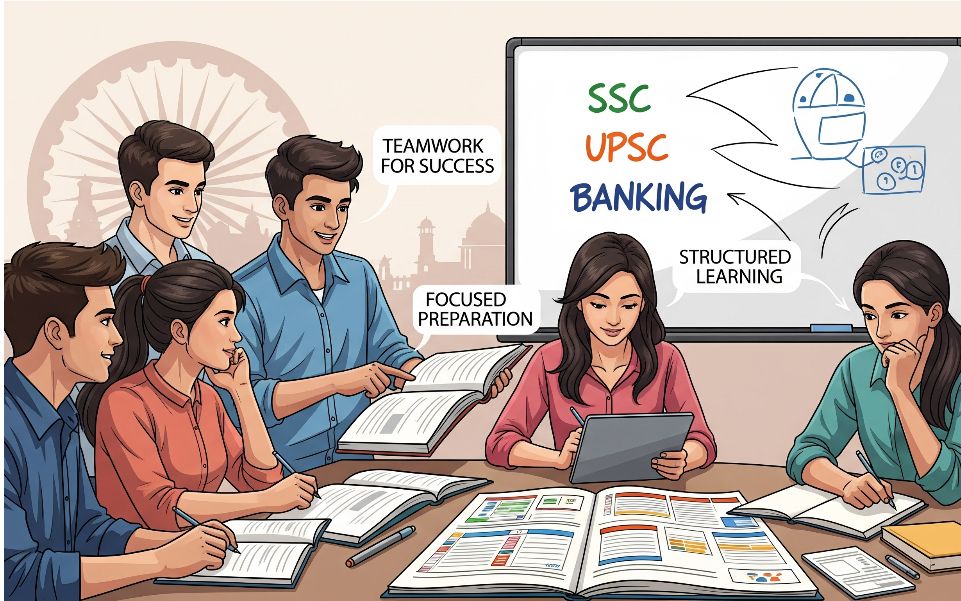India’s government employment landscape is heading for a massive transformation between 2025 and 2030, and FastJob.in, one of the country’s leading government job portals, has outlined key trends that could redefine public sector careers in the years ahead.
According to FastJob.in’s data insights, the coming decade will witness lakhs of new government vacancies emerging across traditional sectors like Railways, Defence, and Education, as well as in modern domains such as Digital Governance, Artificial Intelligence, Cybersecurity, and Green Energy.
The platform’s analysis emphasizes that this new wave of government jobs will not only offer stability but also demand advanced digital and technical skills, creating a dynamic employment environment that blends public service with innovation.
Digital India to Unlock Thousands of New Opportunities
The government’s continued focus on Digital India and paperless governance is reshaping how administrative systems function. Departments are now moving toward automation, online data handling, and AI-based service delivery — all of which require skilled technical staff.
FastJob.in’s research suggests that departments like NIC, MEITY, ISRO, and DRDO will significantly expand their technical teams. Roles such as data entry officers, cybersecurity analysts, network engineers, and AI specialists will become increasingly common.
By 2030, FastJob.in estimates that over one lakh new digital and IT-based roles will open up within various ministries and government agencies — a clear sign that India’s bureaucracy is evolving into a digitally equipped ecosystem.
Retirement Wave to Create Huge Vacancy Pool
Another defining trend highlighted by FastJob.in is the retirement wave expected between 2025 and 2030. Employees who entered service during the 1990s hiring boom are approaching the end of their tenure, especially in Group B and Group C categories.
This mass retirement is projected to create between 80,000 and one lakh new openings every year, particularly in departments such as Railways, Defence, Education, and State Administration.
Experts suggest that this natural churn will lead to one of the largest recruitment phases in recent decades, as departments seek to replace retiring personnel with younger, digitally trained professionals.
FastJob.in advises aspirants to start early for exams such as SSC CGL, UPSC, and State PSCs, since these are expected to see an uptick in vacancies due to this demographic shift.
Healthcare and Education to See Major Expansion
Public health and education — two of India’s most employment-intensive sectors — are also set for massive recruitment drives. Initiatives such as the National Education Policy (NEP) 2020 and healthcare programs under AIIMS, ESIC, and NHM are creating fresh demand for teachers, doctors, pharmacists, and research professionals.
FastJob.in’s projections indicate that by 2030, more than 70,000 new positions will emerge in these two sectors combined. The focus will be on strengthening public health infrastructure, improving teacher-to-student ratios, and expanding digital education networks across states.
Defence and Paramilitary Recruitment to Stay Strong
India’s defence and security establishments will continue to be major employers. Recruitment through initiatives such as the Agniveer program and modernization of paramilitary units like BSF, CRPF, CISF, and ITBP will keep the defence sector’s hiring pace consistent.
FastJob.in estimates that defence-related jobs could account for up to 25% of total government employment by 2030, including both technical and operational roles.
For aspirants, this means steady opportunities not just in traditional uniformed services, but also in logistics, engineering, communications, and technology management within the defence sector.
Green Energy and Infrastructure Projects to Drive Employment
India’s focus on sustainable growth and infrastructure expansion is expected to create new kinds of government jobs that didn’t exist a decade ago.
Projects under the Smart Cities Mission, solar and renewable energy initiatives, and transport and metro expansion will open up positions for civil engineers, environmental officers, project coordinators, and technical assistants.
FastJob.in points out that this is one of the most exciting developments in government employment — where sustainability and technology intersect to produce future-ready roles.
Skill-Based Hiring Will Replace Degree-Based Systems
The government is steadily reforming its recruitment process to emphasize practical skills and technical proficiency over traditional degree-based qualifications.
According to FastJob.in, computer-based testing (CBT) and skill verification modules will become the standard across recruitment boards like SSC, UPSC, and State PSCs.
Typing tests, computer literacy components, and scenario-based problem-solving tasks are being integrated into examination frameworks, signaling a clear shift toward merit-based and performance-driven hiring.
AI to Revolutionize Recruitment Processes
Artificial Intelligence will soon play a central role in streamlining recruitment systems. FastJob.in reports that many boards are experimenting with AI-driven shortlisting tools designed to improve transparency and efficiency.
These systems can reduce evaluation time, eliminate manual errors, and prevent fraud, ensuring fairer results for candidates. As these technologies mature, aspirants are advised to become comfortable with digital test formats, online applications, and remote assessments — the future hallmarks of public sector exams.
Public-Private Hybrid Roles and State-Level Hiring on the Rise
FastJob.in also notes the rise of public-private partnership (PPP) models in job creation. Under these frameworks, hybrid roles are emerging that combine public service objectives with private-sector implementation.
Sectors such as Skill India, Digital India, and Rural Infrastructure Development are likely to generate these hybrid opportunities, offering contractual employment backed by government funding.
At the same time, state-level recruitment is gaining strength. Public Service Commissions in Uttar Pradesh, Madhya Pradesh, Rajasthan, Bihar, and Odisha are planning more frequent examinations to fill administrative, police, and technical posts at the grassroots level.
Preparing for the Next Five Years
For government job aspirants, the message from FastJob.in is clear: the next five years will reward those who combine traditional preparation with digital adaptability.
Candidates are encouraged to build digital skills, practice computer-based tests, and follow verified job alerts from authentic platforms like FastJob.in. Regular mock tests, online study tools, and multi-exam strategies will be essential to stay competitive in a rapidly changing landscape.
Conclusion: The Decade of Digital Public Service
Between 2025 and 2030, India’s government job ecosystem will evolve beyond recognition. FastJob.in’s forecast of around five lakh new openings across central and state departments signals both continuity and transformation — where traditional roles will coexist with digital, data-driven, and sustainability-focused careers.
As the line between technology and governance continues to blur, the next generation of public servants will be defined not only by their qualifications but by their digital readiness and problem-solving ability.
For millions of young Indians aspiring to serve the nation, this is more than a recruitment forecast — it’s a roadmap to the future of public service.



